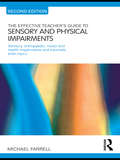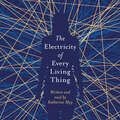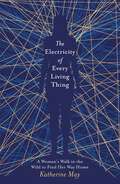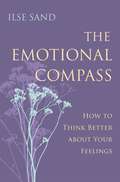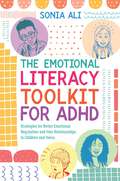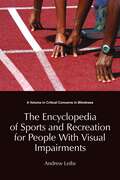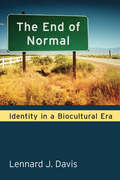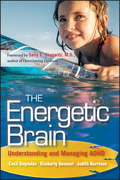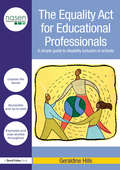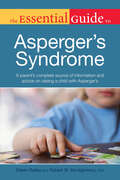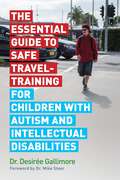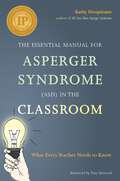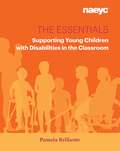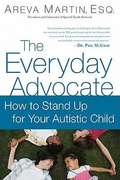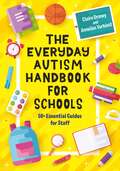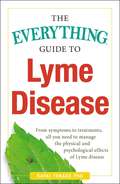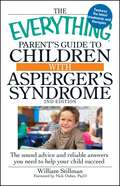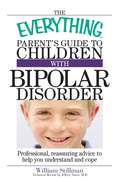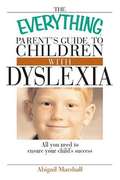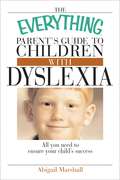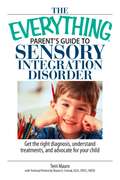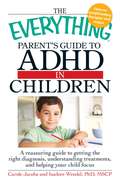- Table View
- List View
The Effective Teacher's Guide to Sensory and Physical Impairments: Sensory, Orthopaedic, Motor and Health Impairments, and Traumatic Brain Injury (The Effective Teacher's Guides)
by Michael Farrell'Michael Farrell offers well sourced overviews of the conflicting and contradictory advice that is available to schools, suggests a variety of solutions to challenges, empowering the reader to make their own choices.' - Carol Smart, Special Needs Information Press Fully updated with the latest research and advice on best practice, this new edition of The Effective Teacher’s Guide to Sensory and Physical Impairments covers a range of conditions that cause learning difficulties for children, including visual impairment, hearing impairment, deafblindness, orthopaedic impairment, motor disorders and health impairments, as well as a brand new chapter on traumatic brain injury. Teachers are likely to meet children with varying types and degrees of sensory and physical impairments. This comprehensive guide equips you with informed and practical strategies to ensure that all pupils are included and provided for in the best possible way. The new edition has also been adapted to be more widely relevant to readers in different countries, focusing more on the strategies that work regardless of national context. Writing in his popular accessible style, Michael Farrell suggests the best ways of dealing with a variety of conditions, always with practical classroom situations in mind. In each section, the book: explains the legal contexts looks at the range of provision suggests intervention and support strategies gives points for reflection and suggested further reading. Highly accessible and authoritative, this book provides teachers with an invaluable resource to help you create a truly inclusive classroom.
The Effects of Blindness and Other Impairments on Early Development
by Zofja S. JastrazembskaA scientific study of blind children, where there are frequently marked delays in locomotor achievements by sighted standards.
The Electric Eel
by Christopher W. CoatesDid you know that the adult eel is blind? That baby eels have bright blue eyes? That a whopping four-fifths of the eel's body is tail? There are lots more interesting things to know about eels, and you can read about them in this delightful book.
The Electricity of Every Living Thing: A Woman's Walk in the Wild to Find Her Way Home
by Katherine MayLast summer, Katherine May was approaching 40, feeling overwhelmed by motherhood and lacking connection with others, lost in a world of inundation and expectation. She had always felt different but this feeling was new. She wanted to get out, get free and find herself again - and so set about walking the rugged 450 mile South West Coast Path. However, this journey uncovers more than she ever imagined. By chance, en route to the walk, Katherine hears a radio show and the guests are speaking about Asperger's Syndrome. Things begin to fall into place - could this explain the white-outs, the excruciating confusion around social contact, the electric feeling of every living thing?After a formal diagnosis, Katherine begins to unravel this new perspective of her life. Through her physical journey comes an emotional one - of accepting who she is and moving forward. It's not just about walking or Asperger's; this is one woman's journey to feel free within herself, something that everyone can relate to.Read by Nathalie Buscombe(p) Orion Publishing Group 2018
The Electricity of Every Living Thing: From the bestselling author of Wintering
by Katherine MayFrom the bestselling author of Wintering, Katherine May, The Electricity of Every Living Thing is a life-affirming and poignant exploration of nature, and how reconnecting to wild landscapes can create peace in our unquiet minds.'A windswept tale, beautifully told' Raynor Winn, author of The Salt Path 'A manifesto for the value of difficult people. I loved it' Amy Liptrot, author of The OutrunIn August 2015, Katherine May set out to walk the 630-mile South West Coast Path. She wanted to understand why she had stopped coping with everyday life; why motherhood had been so overwhelming and isolating, and why the world felt full of inundation and expectations she can't meet. Setting her feet down on the rugged and difficult path by the sea, the answer begins to unfold.The Electricity of Every Living Thing tells the story of the year in which Katherine comes to terms with a diagnosis which shakes her to her core. It leads to a re-evaluation of her life so far - a kinder one, which finally allows her to be different rather than simply awkward, arrogant or unfeeling. The physical and psychological journeys become inextricably entwined, and as Katherine finds her way across the untameable coast, she also finds the way to herself.What readers are saying about The Electricity of Every Living Thing:'Honest and sensitive' 'The astonishing sensitivity and awareness in her writing, both about the beautiful landscapes and nature around on her walks, and in relation to her family, friends and self put paid to many outdated myths about what it is like to be autistic''Compelling and transformative. I could not put this book down so I stayed in bed and read it in one go.''Katherine has a fantastic way with words, I could read her books for hours on end, they are calming and relatable.''Read it - you won't regret it.'
The Emotional Compass: How to Think Better about Your Feelings
by Ilse Sand'Feelings are something we have, not something we are.' Revealing the complexity of emotions such as happiness, anger, fear, and jealousy, and how these are based on our perception of other people, Ilse Sand offers her professional wisdom on the psychology of feelings. Establishing that emotions are not always as appropriate as they first appear to be, the book encourages you to take a closer look at why you are feeling certain things, and how you can change how you feel. Especially written for highly sensitive people, guidance is included on how to identify the vulnerable feelings that often underlie our more volatile emotional states, and practical activities are suggested to help to embrace or reject sadness, delay impulsive actions, and allow yourself to be happy. Drawing on real-life examples throughout, the book offers you the means to improve your understanding of not only your own emotions and emotional actions, but those of others. The book will be immensely useful not only to people who feel things strongly, but to those who have trouble understanding or interpreting emotions and how to respond to the feelings they provoke.
The Emotional Literacy Toolkit for ADHD: Strategies for Better Emotional Regulation and Peer Relationships in Children and Teens
by Sonia AliChallenges with emotional regulation and rejection sensitivity can disproportionately affect children and teens with ADHD, impacting on their development at school and their relationship with their peers.Developed for children and young people who experience difficulties with emotional regulation, SEND specialist Sonia Ali, shares a mentoring Intervention programme to support a child or young person with this issue at school or at home. Covering concepts like the fight, flight or freeze response and the 'Window of Tolerance', managing anger outbursts and overwhelm or navigating conflict with peers, this easily digestible book will help educators and carers support children and teens to develop core emotional literacy skills in an enjoyable way!This accessible, step-by-step guide is packed with activities, including role-play situations, discussion-based statements, quizzes and more. The programme can be followed sequentially or 'dipped into' to support a child with a particular issue when relevant.
The Encyclopedia of Sports and Recreation for People With Visual Impairments
by Andrew LeibsNot long ago, most blind and visually impaired people grew up without ever playing sports; they sat on the sidelines, and kept score during gym-protected rather than included. In the 1980s, few people had ever heard of the Paralympic Games or accessible recreation. <P> Today, promising blind athletes can receive residency at the US Olympic Training Center; runners compete for prize money and national championships, and most ski resorts offer adaptive programs throughout the year where blind people can ski, cycle, and kayak-often for free. The Paralympic movement, the Americans with Disabilities Act of 1990, and ever-increasing expectation for inclusion among the disabled have inspired an explosion of accessible sports, fitness, and recreation programs that accommodate the blind. <P> The Encyclopedia of Sports & Recreation for People with Visual Impairments is the first consumer- focused, action-oriented guide to this new world of accessible activity, profiling the people, programs, and products that are helping move blind and visually impaired people from the sidelines into the game. This groundbreaking guide profiles every accessible blind sport and recreation activity with entries that outline how athletes (both novice and elite) got involved in the sport and how participation has shaped their life. The book also profiles major blind sports organizations and includes chapter and resource listings on camps and accessible recreation providers. Through this book, blind people will be inspired to embrace sports as the rest of society does-as a vital component of personal expression and human interaction that opens paths to adventure,
The End of Normal: Identity in a Biocultural Era
by Lennard DavisIn an era when human lives are increasingly measured and weighed in relation to the medical and scientific, notions of what is "normal" have changed drastically. While it is no longer useful to think of a person's particular race, gender, sexual orientation, or choice as "normal," the concept continues to haunt us in other ways. In The End of Normal, Lennard J. Davis explores changing perceptions of body and mind in social, cultural, and political life as the twenty-first century unfolds. The book's provocative essays mine the worlds of advertising, film, literature, and the visual arts as they consider issues of disability, depression, physician-assisted suicide, medical diagnosis, transgender, and other identities. Using contemporary discussions of biopower and biopolitics, Davis focuses on social and cultural production--particularly on issues around the different body and mind. The End of Normal seeks an analysis that works comfortably in the intersection between science, medicine, technology, and culture, and will appeal to those interested in cultural studies, bodily practices, disability, science and medical studies, feminist materialism, psychiatry, and psychology.
The Energetic Brain
by Sally E. Shaywitz Cecil R. Reynolds Kimberly J. Vannest Judith R. HarrisonHow to get past the myths, tap into the creativity of the ADHD mind, and thriveADHD affects millions of people-some 3 to 5% of the general population. Written by a neuroscientist who has studied ADHD, a clinician who has diagnosed and treated it for 30 years, and a special educator who sees it daily, The Energetic Brain provides the latest information from neuroscience on how the ADHD brain works and shows how to harness its potential for success. It distills the latest research findings to give readers the most up-to-date information available and provides practical strategies for managing ADHD-and thriving-at school, at work, and at home, from childhood through adulthood. Debunks popular (and destructive) myths about ADHDCovers how to manage ADHD with medication or without, what parents can do to help, and how to thrive with ADHD throughout the lifespanOffers effective academic and behavioral interventions for school, and helpful accommodations for the workplaceThe Energetic Brain provides a truly thorough view of ADHD, making it an invaluable guide for parents, teachers, and those living with ADHD.
The Equality Act for Educational Professionals: A simple guide to disability inclusion in schools (nasen spotlight)
by Geraldine Hills"A definite must for SENCOS." -- Urmston Junior School "A good insight into process of tribunal and what the Equality Act means." -- Team Leader, St Paul's CE Primary School 'A much needed resource in supporting schools, centres, day nurseries and community childcare provision to understand the complexity of the issues surrounding SEN... A valuable tool.’ -- Gerri Ross – Head of Old Moat Sure Start Children’s Centre, UK "Straightforward and easily accessible...I would recommend this book to undergraduates and professionals alike who have an interest in ensuring that the rights of disabled children are upheld." -- Dr Craig Blyth, School of Education, University of Manchester, UK Under the Equality Act (2010), all schools and service providers have a legal obligation to make provision for disabled pupils, staff and school users. If you’re feeling confused and concerned about the content and implications of the Disability Duty Act (1995) and the more recently released Equality Act (2010), and how it affects your setting, this essential book will help you unpick the issues in a user-friendly and easily accessible way. This highly practical resource: explains the main parts of Equality Act (2010) as it affects disability in a way that will encourage all members of staff within a school to feel confident that they are correctly implementing its requirements; discusses ‘reasonable adjustments’ and ‘less favourable treatment’ which are at the heart of the legislation; shows how ‘less favourable treatment’ and ‘reasonable adjustments’ apply to admissions, exclusions, handling of medicines and during school trips; uses examples and case studies throughout, and highlights the key factors for success in making reasonable adjustments; takes readers through the process of an alleged act of discrimination against the school, and how it may be resolved, up to and including the SEND tribunal process. The author brings a wealth of experience to this topic, both as a parent of a disabled child and as a trainer of professionals. She uses her unique insight to develop skills and awareness in anyone who follows her material, and shows through tried and tested concepts and methods, how schools and settings can avoid costly and stressful tribunals. Headteachers, teachers, SENCos, Sure Start Centre Managers and anyone who works in educational settings will find this book essential to their professional development and a fantastic source of support and help.
The Essential Guide to Asperger's Syndrome: A Parent’s Complete Source of Information and Advice on Raising a Child with Asp (Essential Guide)
by Eileen Bailey Robert MontgomeryAsperger's Syndrome is a complicated condition that is often misunderstood and misdiagnosed. Parents and caregivers can often find themselves bewildered by the circumstances and accompanying behaviors that are associated with raising a child with Asperger's. The Essential Guide to Asperger's Syndrome is a goldmine of practical advice for dealing with many of the common situations that often confront Aspies and their parents. Through the practical and immensely helpful tips in this book parents will learn how to turn potentially stressful situations into calm, manageable moments. Authoritative and complete, this book provides must-have information on seeking a proper diagnosis, different treatment options, developing social skills, dealing with bullying, finding the right school, and helping the young adult with AS transition to college or more independent living. Helping everyone in the family thrive and survive the challenges of Asperger's, this book will be a guiding light to any parent with an Aspie child.
The Essential Guide to Safe Travel-Training for Children with Autism and Intellectual Disabilities
by Dr Desirée Gallimore Dr Mike Steer Dr Lizzie D'Avigdor Martha D'AvigdorFor those growing up with an intellectual disability or autism, comfortable, safe and independent travel will prove an invaluable life skill. The key to pursuing fulfilling work and leisure activities and developing as an individual, it also brings a liberating level of self-sufficiency and reassurance of equality within society. Arriving at this goal can be daunting. Dr Gallimore's straightforward five-step system will guide parents and professionals through successful training for children of any age and ability. Focusing on understanding each child's individual goals and challenges, it gives you the 'ingredients' needed to fully prepare for each journey in advance, and shows how to judge when to step back and let the child progress alone. Addressing specific fears and obstacles that make travel difficult for children with learning difficulties, it sets out all the precautions necessary to safeguard children and others as they learn to reach their chosen destinations. Clear-cut and far-reaching, this book is enriched by Dr Gallimore's extensive experience as a psychologist, mobility specialist and travel-trainer. It is a heartening resource and will be necessary reading for anyone working with a child to get them on their path to independent travel.
The Essential Manual for Asperger Syndrome (ASD) in the Classroom: What Every Teacher Needs to Know
by Kathy Hoopmann Rebecca HoukamauPerfect for time-poor teachers, Kathy Hoopmann's essential handbook is an easy-to-navigate resource that promotes a positive learning environment in which students with Asperger syndrome (ASD) can thrive. Kathy's unique ability to explain the ASD mind-set shines through as her concise descriptions reveal how to recognise and develop the child's strengths to the fullest potential whilst guiding and mentoring through areas of difficulties. Full of effective and innovative strategies, the book covers areas such as meltdowns, forming friendships, literal thinking and speaking, and the overwhelming influence of sensory sensitivities. Activities to help explain the child's behaviour to other students are also included which fosters understanding and acceptance. A 'Home Link' section adds vital information about how to work with parents and other caregivers to create safe, loving and fun environments for the child at home and at school. With illustrations throughout, this book will be of immeasurable value to anyone who is working in a classroom setting with children with ASD.
The Essentials: Supporting Young Children with Disabilities in the Classroom (The Essentials Series)
by Pamela BrillanteChances are, at some point in your early childhood career, you will work with children who have, or might have, a developmental delay or disability, along with their families. This book offers essential information about disabilities and how they impact young children’s learning and development. More than that, it encourages you to go beyond a child’s disability label to see her strengths, needs, interests, and preferences and to figure out how best to support those in the classroom, just as you do for any other child. Regardless of medical diagnoses or individual challenges, children with disabilities are first and foremost children. This book is a resource for early childhood educators and preservice teachers who work or will work with children birth through age 8 who have developmental delays or disabilities. Program directors and administrators as well as providers of physical, occupational, and speech-language therapy will also find the information in this book useful as they work with teachers and families to help children become active participants in their environments and master a variety of skills. This book will help you understand more about disabilities and their implications for children and families, and this knowledge, along with your understanding of children in general, will help you recognize and rebut inaccurate or harmful stereotypes and attitudes about individuals with disabilities.
The Everyday Advocate
by Martin Esq. Areva"THE guide for getting the best life possible for your child. . . invaluable. " -Dr. Phil McGraw Nationally recognized expert on autism advocacy Areva Martin shares her hard-won knowledge as a parent of an autistic child and an individual rights attorney. In The Everyday Advocate, she lays out vital and relevant step-by-step instructions to parents facing the seemingly impossible odds of advocating for a child with autism. Parents need to become activists for their children's rights to services and learn how to safeguard those rights-both in school and in the larger outside world. An invaluable resource, The Everyday Advocateoffers practical, real-world actions that work, lists helpful websites and organizations, and gives parents and caregivers the emotional support they need as they face the challenge of successfully standing up for children with special needs.
The Everyday Autism Handbook for Schools: 60+ Essential Guides for Staff
by Claire Droney Annelies VerbiestA practical, easy-to-read introduction to the ideas and strategies that can be implemented within the classroom to help autistic children achieve their full potential. With an introduction to autism and its key differences, insights from autistic individuals and case studies drawn from years of experience, this is the definitive resource for busy teachers supporting autistic children within a mainstream or specialist school environment.This book provides guidance on a variety of topics related to teaching autistic children in primary school, including adapting the curriculum, ensuring effective communication with staff and parents, fostering emotional regulation, as well as staff self-care. Each chapter includes easy-to-follow guides and resources, providing solutions, direction and support for teachers to help students on the autism spectrum to thrive.
The Everything Guide To Lyme Disease: From Symptoms to Treatments, All You Need to Manage the Physical and Psychological Effects of Lyme Disease (The Everything)
by Rafal TokarzA comprehensive all-in-one guide to Lyme disease, including psychological as well as physical symptoms, along with traditional and alternative treatments.Lyme disease is one of the most rapidly emerging infectious diseases in North America and Europe, transmitted to humans by the bite of an infected tick. Symptoms include the classic “bull’s eye” rash, fever, and headache, and current research indicates that 300,000 Americans are diagnosed with Lyme disease annually, ten times higher than previously reported. This indicates a tremendous health problem, heightened by the fact that Lyme disease can manifest not only in physical symptoms, but psychiatric illness such as cognitive dysfunction, memory deficit, and rage issues. In The Everything Guide to Lyme Disease, you will find the most up-to-date and expert information on all aspects of the disease, including how to prevent it, find the best treatments, and deal with the psychological effects of Lyme disease.
The Everything Parent's Guide To Children With Asperger's Syndrome
by William StillmanWith The Everything Parent's Guide to Children with Asperger's Syndrome at your side, you'll take the first steps toward understanding this pervasive development disorder and how it may impact your child. This complete handbook for coping with daily life helps you:Get a diagnosis and understand the resultsDiscover the best options for education and learningWork to improve your child's social skillsIdentify triggers that lead to sensory overload, such as sounds, bright lights, or certain textures and fabricsRecognize symptoms of meltdowns and work with your child to prevent themEducate family and friends about Asperger's to provide a supportive and loving environmentExplore other resources, including reading lists, Web sites, and support groupsThe Everything Parent's Guide to Children with Asperger's Syndrome shows you how you can maintain a positive attitude, honor your child's unique experience, and strengthen the bond between you and your child.
The Everything Parent's Guide To Children With Asperger's Syndrome: Help, Hope, And Guidance
by William StillmanWith The Everything Parent's Guide to Children with Asperger's Syndrome at your side, you'll take the first steps toward understanding this pervasive development disorder and how it may impact your child. This complete handbook for coping with daily life helps you:Get a diagnosis and understand the resultsDiscover the best options for education and learningWork to improve your child's social skillsIdentify triggers that lead to sensory overload, such as sounds, bright lights, or certain textures and fabricsRecognize symptoms of meltdowns and work with your child to prevent themEducate family and friends about Asperger's to provide a supportive and loving environmentExplore other resources, including reading lists, Web sites, and support groupsThe Everything Parent's Guide to Children with Asperger's Syndrome shows you how you can maintain a positive attitude, honor your child's unique experience, and strengthen the bond between you and your child.
The Everything Parent's Guide To Children With Bipolar Disorder: Professional, Reassuring Advice to Help You Understand And Cope
by William StillmanWhat does it mean for your child to be diagnosed with bipolar disorder? Where can you go to understand mood disorders, depression, and the highs and lows associated with this condition? The Everything Parent’s Guide to Children with Bipolar Disorder is an authoritative handbook designed specifically for parents with questions about their child’s emotional well-being, options for medication and therapy, and educational considerations.Author William Stillman helps you:Define bipolar disorderRecognize symptoms of mental health issuesFind a doctor and get a diagnosisHeighten awareness of depression, mania, and mood swingsMaintain healthy family relationshipsNavigate the teen yearsComplete with professional advice to help you cope with daily life, this all-inclusive resource provides reassuring answers for you and your child.
The Everything Parent's Guide To Children With Dyslexia: All You Need To Ensure Your Child's Success
by Abigail MarshallDyslexia affects 10 to 15 percent of the U.S. population. If you're the parent of a child with dyslexia you should read this book. The Everything(r) Parent's Guide to Children with Dyslexia, by Abigail Marshall gives you a complete understanding of what dyslexia.
The Everything Parent's Guide To Children With Dyslexia: All You Need To Ensure Your Child's Success
by Jody SwarbrickAlthough dyslexia affects 10 to 15 percent of the U.S. population, only 5 out of every 100 dyslexics are recognized and receive assistance. If you're the parent of a child with dyslexia, this statistic can be disconcerting, especially when it comes to your child's academic performance and developing social skills. The Everything Parent's Guide to Children with Dyslexia gives you a complete understanding of what dyslexia is, how to identify the signs, and what you can do to help your child. This authoritative book seeks to alert parents to the special needs associated with this learning disability and offers practical suggestions for getting involved in the classroom.The Everything Parent's Guide to Children with Dyslexia shows you how to:Select the right treatment programs for your childSecure an IEPChoose a school and reduce homework strugglesDevelop your child's skills with the use of assistive technologyMaintain open communication and offer supportThe Everything Parent's Guide to Children with Dyslexia is your first step in facing the challenges of dyslexia with a positive attitude.
The Everything Parent's Guide To Sensory Integration Disorder: Get the Right Diagnosis, Understand Treatments, And Advocate for Your Child
by Terri MauroFor kids living with Sensory Integration Disorder, the world can be a scary place, full of potentially stressful experiences. Kids with Sensory Integration Disorder can howl in discomfort over the feel of a shirt tag or a sock seam on bare skin. They may find the sound of a whisper to be as loud and frightening as a siren, and may perceive the caring touch of a parent or jostling in the school lunch line as equivalent to an assault.The Everything Parent's Guide to Sensory Integration Disorder:Provides an in-depth definition of Sensory Integration Disorder and explains its effectsHighlights occupational therapy treatments and explains techniques you can use outside of the therapist's office to calm your childIncludes helpful advice for parents teaching their children how to deal with this disorder at school, home, and play, from childhood through adulthoodIn The Everything Parent's Guide to Sensory Integration Disorder, you'll find the answers you need as you search for ways to help your child. This reassuring handbook examines various forms of treatment and therapy, and provides professional advice for helping children with SID succeed in school, at home, and with friends.
The Everything Parent's Guide to ADHD in Children: A Reassuring Guide to Getting the Right Diagnosis, Understanding Treatments, and Helping Your Child Focus
by Carole Jacobs Isadore WendelA reassuring guide to getting the right diagnosis, understanding treatments, and helping your child focus
